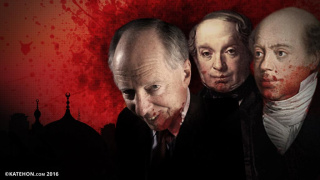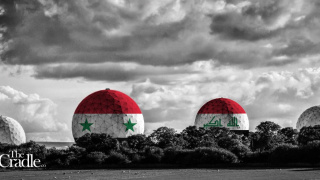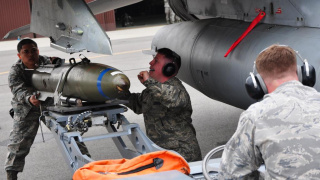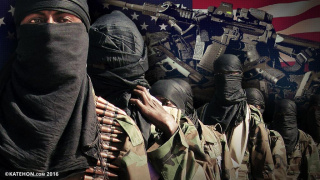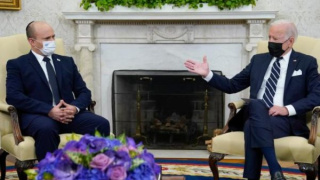Israel or Iran, Who Hides the Nukes?
Israeli Prime Minister Benjamin Netanyahu is accustomed to making a show of his performances. Especially when it comes to Iran. In 2012, speaking at the UN General Assembly, he showed a poster on which a bomb was drawn. Netanyahu has drawn a red line in the picture and warned that after it is passed by the summer of 2013, Iran will definitely get an atomic bomb. And to stop this, Israel will have to use military force.
Three years later, the six international mediators - Russia, the three EU countries, the United States, the PRC and the Islamic Republic of Iran (IRI) - signed a treaty (the Joint Comprehensive Action Plan, the SVAP), according to which Tehran refused to develop nuclear weapons. The agreement not only did not reassure, but further strengthened the pressure of Israel, which continued to accuse Iran of secretly developing illegal weapons. Donald Trump's decision of May 9 on the US withdrawal from the SVAP legitimized the accusations of Tel Aviv, which intensified air strikes against pro-Iranian forces in Syria, risking partnership with Russia. The day before, Netanyahu issued a video message in which he presented dozens of CDs allegedly containing evidence of a secret nuclear weapons development program from Iran.
Although all the other countries participating in the VCPA treaty confirm Iran's compliance with its obligations, and Iranian facilities are under the supervision of the IAEA, it is imperative for Israel to expose Iran as a "criminal". Recall, a few hours after Trump's verdict of May, as the IDF began bombing the southern outskirts of Damascus. Israeli pilots made "punitive flights" to Syria with the same frequency as they ate, and this story continued until the crash of the Russian Il-20. The Russian Ministry of Defense completely and completely blamed the Israeli leadership. The subsequent Syrian deliveries of Syria cooled and frightened the "hotheads" in Tel Aviv.
Now, Israel needs new justifications for continuing the raids against Iran in Syria. On the rostrum of the UN General Assembly, Netanyahu repeated the etude of six years ago.
The Prime Minister spoke about a secret warehouse near Tehran, where about a dozen containers with a weight of up to 300 tons are stored, which are connected with Iran's nuclear project. Netanyahu in the form of "evidence" showed a satellite image and a photo with an iron gate. He suggested that residents of the Iranian capital acquire Geiger counters in order to check the radiation level.
"What Iran hides, Israel will find," Netanyahu said, adding that his country will never allow Iran to obtain nuclear weapons.
The Iranian delegation to the UN called Netanyahu "Israeli showman" and accused him of spreading "monstrous lies". Iranian Foreign Minister Mohammad Javad Zarif went even further.
No arts & craft show will ever obfuscate that Israel is only in our region with a * secret * and * undeclared * nuclear weapons program - including an * actual atomic arsenal *. Time for Israel to fess up and open its illegal nuclear weapons program to international inspectors.
- Zarif wrote on Twitter.
The statement by the Israeli Prime Minister from the UN rostrum on the discovery of the secret "atomic warehouse" in Tehran was a continuation of the presentation he held in the building of the Israeli Defense Ministry in May this year. Then Netanyahu presented a rack with "exact copies" of documents about the "Project Amad", which were obtained by Israeli intelligence. This is 55 thousand pages, another 55 thousand pages and 183 CD-ROMs about the Iranian "nuclear dossier". Globally, both Israel and the United States are interested in extruding Iran from the territory of Syria and Yemen, as well as limiting Iranian influence in Iraq, since a strong Iran is able to pursue a policy in the Middle East contrary to their interests.
Iran is Russia's ally in the Syrian settlement, which supports the government of Bashar Assad and the territorial integrity of Syria. With Israel until the collapse of the IL-20, partnerships were maintained and there were "gentlemen's agreements" on mutual guarantees of security. However, the mutual confrontation between Iran and Israel, which consider each other as the main threat to their existence, increases the risk of WMD proliferation in the Middle East. Russia has consistently advocated the nuclear-free status of the region, and this was repeatedly said by Vladimir Putin and Foreign Minister Sergei Lavrov.
Currently, the EU, China and Russia are doing everything to save the SVPD and even proposed the creation of a special mechanism that will circumvent the anti-Iranian sanctions of the United States. Trump's national security adviser, John Bolton, threatened that he would not allow anyone to violate the sanctions. According to him, by November 4, sales of Iranian oil should drop to zero barrels per day. The Iranian economy is in crisis, the rial has lost 75% of the value since the beginning of the year.
In June, the spiritual leader of the Islamic Republic of Iran, Ayatollah Ali Khamenei, issued an order to begin building up uranium enrichment facilities. International pressure, coupled with worsening financial and economic welfare, will strengthen the voice of the ultra-conservatives in Iran, who did not trust the nuclear deal from the very beginning, and develop nuclear weapons. And the US and Israel, apparently, it is necessary to justify their aggression against Iran.

